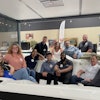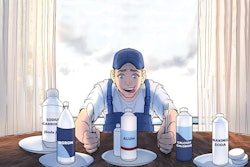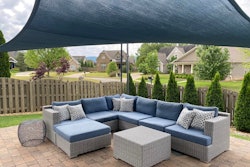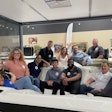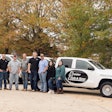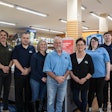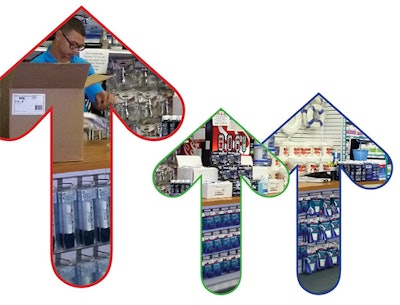
Some retailers think in terms of square footage, but for Corinne Kraft, owner of Valley Pool & Spa and RB Control Systems, it's every second that counts. By making a point to upsell at the counter, she says retailers can see a significant boost in revenue — and all with sales pitches that take less than 30 seconds to deliver. The math backs her up:
"The season for us lasts seven months out of the year. If you sell an add-on item with a $6 profit to 12 customers a day, you increase your gross profit by $15,000. To do that with two items and 24 customers, and now you've increased your gross profit by $60,000 in just seven months. And that's an increase in profits without an increase in expenses," she says.
For this Pittsburgh-area pool and spa retailer, the emphasis on upselling and concise verbal pitches has paid off handsomely. We talked to Kraft about her approach, from the early preparation and staff training to how she keeps the momentum going throughout the season.
First Steps
"Upselling is not just something that happens on a whim; it's something you need to prepare for with merchandising, pricing and training," Kraft says.
For Kraft, the process starts with a planning session during the off-season. With the help of a couple other key players in the business, she uses point-of-sale software to review sales records over the past year, looking for trends, strengths and weaknesses within her product offerings.
"The point-of-sale system is an integral part of this because first of all, you need to look at last year's report. What sold? Did we make the money we needed to make on this product? What were our top 10 items in these categories? What were our slow movers — let's get rid of those and make room on the floor for product that does move. If we're going to bring in 10 new products, what 10 products can we eliminate from the line?" she says.
This clears the way to identify what might make a good upsell. When zeroing in on products, she says, focus on high-margin items that aren't your customers' go-to items.
"Everybody's buying a bag of shock or a bucket of chlorine, so because those are highly competitive items, they're not your high-margin items," she says. "And those you don't have to upsell to people, because they're already coming in for those items anyway. But when they do, it becomes an opportunity to increase your sale."
The key to success here is what Kraft calls "relating." The products you push at the counter should relate to what the customer is already buying, the time of year or a particular situation:
Relating by product: "If I'm selling a bag of D.E., I can upsell a D.E. scoop to go along with that. If I'm going to sell a bottle of surface cleaner to clean the scum line off around the edge of the pool, I have the opportunity to upsell some type of scrub brush that would be used with it."
Relating by time of year: "In spring, it's time to put in an enzyme-opening product. That's something a customer may not be coming into buy; they might not even know that's available to them."
Relating by the situation: When a customer is dealing with an issue with their pool or spa, like algae, your pitch is no longer an upsell, but catering to a customer's particular need. "Anytime someone has an algae problem with a sand filter, we'll say the sand assist product helps to clear the algae faster," Kraft says.
Finally, when picking your items, also plan their prices and any special offers you'll establish. "When offering a dollar off coupon, it needs to be priced right so you'll still make your margin while offering that dollar off coupon," Kraft says.
Bring Everyone Together
Planning ahead is critical, but it won't mean much if your team isn't on board.
After Kraft and her management team have an internal meeting, she plans a special meeting/training session with all of the staff from her five stores.
"You want to give employees some ownership of the idea. They're going to promote an idea better if they're involved. So what we do is every January, we get our staff together, maybe it's lunch or dinner, and we sit and we brainstorm."
The meeting starts with a discussion about what products to upsell during the coming season. Then, they develop and practice their pitches.
?"I'm a firm believer in taking the time to write down how you would say it," Kraft says. "I can't tell somebody that works for me, 'This is how you sell a D.E. scoop.' The people that work for me have to figure out for themselves how they're going to sell it."
Kraft likes to split her staff into small teams that practice their pitches to each other before sharing them with the group. Timers are provided to push them to keep pitches under 30 seconds.
"You have to make training enjoyable and you have to get them involved in it. I'm not going to stand at the front of the training class and say, 'This is how you sell this,'" Kraft says.
The Play-by-Play
When the season nears, Kraft distributes "the playbook." It contains a list of the season's targeted upsell items and specific time frames to push them; these are called "play periods."
"We have a three-day event each year in May, so I might make that event a play period in the playbook and pick items that people may buy in bulk.
"So let's say people buy shock by the bag. They're getting 24 bags, and they're saving money by buying it in bulk, but we're suggesting: 'You're buying one case of shock this weekend, why don't you buy two and you'll get two bags for free if you do it that way?'"
Upsell items shift with each play period depending upon what the team wants to push during a particular point of the season. And shifting the focus on items means staffers rotate their pitches, which keeps the momentum going throughout the season.
Offer Incentives
For many retailers, finding qualified staff members is hard — let alone talented sales staff capable of upselling throughout the pool season. Kraft says her team is willing to put in the effort to make these extra sales because of the incentives and awards she offers in return.
"Pay has to be related to performance. And I'm a very firm believer in that," Kraft says. "That's where these goals and incentives come into play."
Rewards can include movie theater tickets, gift certificates to a local restaurant and even paid time off. But companies don't have to break the bank to reward employees; Kraft says free things, like a parking spot close to the front door or being excused from closing duties, are small things that help employee morale.
"It's being creative with the rewards and the incentives and it doesn't have to be a whole lot," she says.
The bottom line: Upselling at the counter can really boost your bottom line. But it won't come without work and a good attitude.
"If the owner of the company isn't enthusiastic about the training or enthusiastic about the products or the incentives, the games, the rewards or the people, then you don't have that trickle-down effect where everyone else is enthusiastic, too," she says.
Comments or thoughts on this article? Please e-mail [email protected].





















